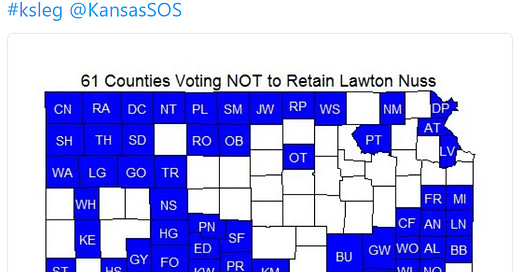Kansas Supreme Court justices always win retention elections statewide but sometimes not in a majority of counties
Flashback: Kansas Supreme Court Judicial Retention Elections in 2010 and 2016
In 2010 all Kansas Supreme Court justices on the ballot won their retention elections, but 10 counties voted not to retain some or all the justices.
In 2016 all Kansas Supreme Court justices on the ballot won their retention elections, but four of five lost in about 60 of the 105 Kansas counties. Only justice Caleb Stegall did not lose in any county. Stegall won retention with 71% of the vote statewide.
2010
From my Kansas Watchdog article on Nov. 10, 2010 …

Unofficial election night results from the Kansas Secretary of State last week showed all four Kansas Supreme Court justices on the ballot were retained with about 62% voting "yes" and about 38% voting "no" to retain the judges. But not all counties voted to retain.
The Supreme Court judges facing retention elections this year were Carol Beier, Dan Biles, Lawton Nuss and Marla Luckert.
Kansas Watchdog analyzed the results by county, which showed 10 counties voted to not retain one or more of the judges out of the 105 counties in the state.

Five counties (Cherokee, Coffey, Logan, Wallace and Wichita) voted "no" to all four judges.
The six counties in northwest Kansas voting "no" are among the smallest 20 counties in the state. Wallace County is the second smallest with a 2009 census population estimate of 1408. Cheyenne County with a population of 2700 was the largest of these six northwest counties.
Coffey and Doniphan counties have similar sizes with 8436 in Coffey and 7624 in Doniphan.
The largest county voting against all four judges was Cherokee with a population of over 21,000. Franklin county, which only voted against Dan Biles, has a population of over 26,000.
Kansas Watchdog asked political science professor Chapman Rackaway at Fort Hays State University for his analysis:
You're delving into a really difficult area to analyze, because most of us assume the voters look at judge retention the same way they look at regular elections. But judges tend not to have TV ads, send out direct mail, or even have names that most people recognize. So the standard ideas about voting referenda on candidates do not necessarily jibe with judicial retention elections.
We can't confidently say that these judges are that unpopular. Most people don't know who they are. Instead, if you look at the numbers specifically in Western Kansas, I think you're seeing more an expression of a philosophy than a particular agenda against these particular justices. It would be facile to say that because two of the justices (Biles and Beier) were appointed by Governor Sebelius and were therefore more likely to be voted against, except for two intervening factors: 1) Few voters know who appointed each justice, 2) Even if they did, the Biles and Beier would be the subject of more ire than Biles and Luckert.
The fact that all four judges were voted against in three western Kansas counties says something else, as I alluded to earlier. A more libertarian streak runs strong in western Kansas, and along with that comes a philosophy of 'throw the bums out'. A number of people I spoke with after the election said that they make a point of voting against all judges to be retained. When you get enough people who approach voting with that philosophy, you will get the circumstance we saw in the general election. So that's what I believe happened: people simply went in and voted against all judges in Logan, Wallace, and Wichita counties. The problem that I'd run in to answering your question as posed, "What issues are Western Kansas counties upset about with the judiciary? " is that western Kansans are generally dissatisfied with government, not just the judiciary. If we ran elections for Congressional or state house seats on a retention basis you would probably see results that mirror the judicial ones. People are dissatisfied with the direction of government and vote against retention to voice that displeasure.
Those same sentiments may simply run higher on the borders. Doniphan, Cherokee, Wallace, and Cheyenne are all examples. I think if you ran a correlation of votes you'd find that the strongest Libertarian and Republican results would come from some of the counties you've pointed out. In the end, then, this is more about general change than it is a specific policy or judge.
2016
From my personal tweets …










2022
What will happen this year in the retention elections of six of the seven Supreme Court justices? On the ballot:
Melissa Taylor Standridge,
Dan Biles,
K. J. Wall,
Marla Luckert,
Evelyn Z. Wilson, and
Caleb Stegall.
Related
Kansas Supreme Court election: What’s at stake?, Wichita Beacon, Sept. 30, 2022.
Kansas judicial elections, Ballotpedia.
Technical
In 2010 online election results at the Kansas Secretary of State’s web site did not include visualization maps of all statewide contests, including the judicial retention elections. The only way to capture the data was to “screen scrape” the web pages and use other software to create the maps.
Even now in 2022 the election-day results with county visualizations disappear a few weeks after the election. (Why aren’t election day results updated after election certifications and left online permanently as the public record?) So, a modified screen scraping approach may still be needed this year to create and retain the maps of results by county.




